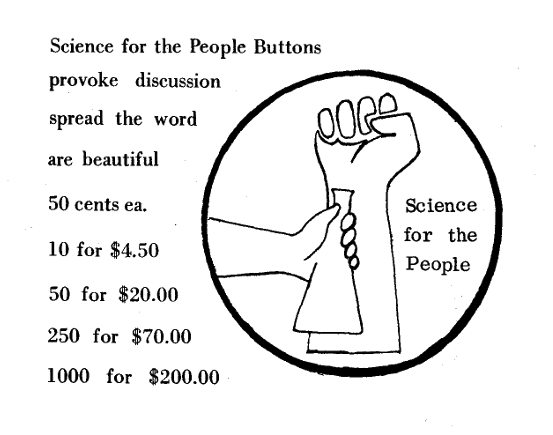At the height of the anti–Vietnam War movement, students and workers across the United States brought internationalist solidarity and revolutionary ideas to the otherwise insulated hall of academic science through campus activism. In February 1969, a group of Stanford and Berkeley physicists announced the formation of “Scientists [and later, Engineers] for Social and Political Action (SESPA)” at the American Physical Society (APS) meeting in New York City. While the APS rejected the physicists’ plea for the professional society to oppose the war, many scientists and technicians across the US responded to SESPA’s spirited call-to-action and independently started local chapters. In December 1969, the Boston area SESPA shocked the panel audience at the American Association for the Advancement of Science (AAAS) annual meeting with a trenchant critique of capitalism, imperialism, and the role of science in class oppression. The radical science movement, as it is later acknowledged, appeared on the scene alongside the slogan “science for the people” chanted by Boston SESPA at AAAS.

The lineage of radical science can be traced further back to the communist-led, anti-fascist popular front of the 1930s. Facing cataclysmic crises of social disintegration, Soviet and British “red scientists” adopted Marxist analyses in their struggle to liberate science from fascism and capitalism. Renowned crystallographer and British communist J. D. Bernal—a leading figure of international organizations of science workers—described part of his vision for a socialist future as “science for the people.” SftP, having gradually rebranded from SESPA after the publication of a bimonthly magazine with the namesake in August 1970, carried on the Bernalist tradition. Radical science resurged with the new left.
For a decade, SftP organized to tackle many pressing issues in science and society, from combating the abuse and misuse of research, to empowering workers and communities in democratizing scientific institutions, to questioning the neutrality and objectivity—i.e., epistemology and ideology—of science itself. Whereas the organization was decentralized and driven by members of diverse priorities at the grassroots, the magazine served as the movement’s nerve center and site of knowledge production. By the twilight of the 1970s, militant action dwindled due to the ending of the Vietnam War as well as to FBI counterintelligence operations. The magazine ceased publication in 1989.
Under an increasingly reactionary political milieu in the era of neoliberal backlash, radical science was extirpated from scientific discourse and popular imagination. Yet, the ideas lived on. In 2014, a history conference at UMass-Amherst reconnected the erstwhile members of SftP. Archival materials and historical memories came alive as activist elders recounted the many issues at the intersection of science and society that remain as, if not more, relevant today as in the 1970s. An inspired new generation of science practitioners returned to the analyses and critiques produced by the previous two generations in interpreting and changing our current conjuncture. In 2018, SftP was officially revitalized.
The new SftP adopted a member-driven, bottom-up organizational structure. The new publication again serves as a record of movement knowledge that guides our activism. The steering committee, constituted by volunteer representatives from various local groups—including international chapters in the UK, Canada, Italy, and Switzerland—provides experience and resource to coordinate future actions informed by revolutionary internationalism.
We welcome all who share our principles to join our organization, build coalition, or start your own chapter/groups to spearhead the radical science movement.
Reach out at mail@scienceforthepeople.org.

